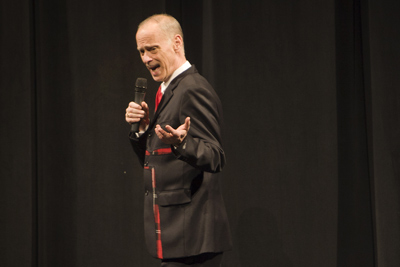A tour through bad taste with John Waters
By Daniel Aloi

Renowned filmmaker John Waters of "Hairspray, "Cry-Baby" and "Pink Flamingos" fame took a Cornell audience on a humorous tour through his films and "my battle against the tyranny of good taste" March 31 at the Schwartz Center. Waters was the star attraction of the "Resoundingly Queer" conference presented by the Department of Theatre, Film and Dance.
"Gay's not enough anymore -- it's a good start," Waters said. "It seems like all the kids are gay at the rich schools, and none of them are at the poor schools -- it's a class issue."
Even as a child, Waters said, "I didn't know what a director was, but I knew I was bossy. … I imagined I owned a dirty movie theater, and the horror it would cause my parents."
"Pink Flamingos" remains his most infamous film, he said. The 1972 shocker was a midnight-movie favorite, giving audiences their first exposure to Waters' low-budget trash aesthetic and to his main star, a drag queen named Divine.
"If I cured cancer and died the next day, that film would be what I was most remembered for," he said.
During his 90-minute talk Waters touched on nearly all of his films, from the 1970 short "The Diane Linkletter Story" through "A Dirty Shame," a 2004 comedy about sex addicts.
"Female Trouble" (1974) starred Divine as a girl who became a mass murderer. "It was about capital punishment, which I'm against because I'm afraid I'll get it," Waters said.
Waters cited William Castle among his "early negative artistic influences." "Polyester" (1981), with Tab Hunter and Divine, used a Castle-like gimmick: Odorama, with scratch-and-sniff cards handed out to audiences.
"The Rugrats later used it and didn't credit us; they said it was an homage," he said. "I said, 'In Hollywood, a check is an homage.'"
"Hairspray" (1988) was Waters' biggest mainstream success. Capturing the music, dancing and racial tensions of early 1960s Baltimore, it was adapted into a Broadway production and then a movie musical, with John Travolta in the Divine role.
"'Hairspray' got a PG-13 -- that was subversive," he said.
After the success of "Hairspray," Waters had his biggest budget on a picture for "Serial Mom" (1994) starring Kathleen Turner. He noted that it is almost impossible to shoot films the way he once did, inexpensively and often illegally.
"When we were making 'Mondo Trasho,' we pulled up to a pig farm outside of Baltimore and started shooting," he said. "They never came out of the house -- we were there for 11 hours!"
Today, Waters said, "a film either costs $5 million or $100 million. I can't really make films anymore the way that I used to. I've made 15 movies, and I'm looking forward to a new book deal.
"Hollywood is looking for the next film made on a cell phone camera," he said. "They weren't looking for me then -- or now! -- but they are looking for you if you make this movie."
Waters said he likes "Bridesmaids" and a few other comedies, "but there are all these movies in bad, bad taste -- and there are 100 that aren't funny. It doesn't seem new to me."
"Resoundingly Queer," March 30-April 1 at the Schwartz Center, featured lectures, academic panels and performances with scholars, activists and artists exploring sound in contemporary studies of gender and sexuality. Keynote presenters besides Waters were David Savran, Ph.D. '78, of City University of New York, on American musicals; and Jill Dolan of Princeton University, on women's music and lesbian feminism.
Media Contact
Get Cornell news delivered right to your inbox.
Subscribe